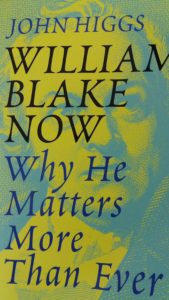 This year has seen two books from John Higgs. The major one was The Future Starts Here, an optimistic response to the world’s daunting problems. But Autumn has brought a second, smaller book, William Blake Now. This is a sort of pop-single in advance of a larger-book-as-album, due in 2021. Although, like the best singles/EPs, the material here is apparently not appearing in the upcoming release.
This year has seen two books from John Higgs. The major one was The Future Starts Here, an optimistic response to the world’s daunting problems. But Autumn has brought a second, smaller book, William Blake Now. This is a sort of pop-single in advance of a larger-book-as-album, due in 2021. Although, like the best singles/EPs, the material here is apparently not appearing in the upcoming release.
Blake is an interesting figure, claimed by both establishment and counter-culture. He’s been gentrified over the years too. In his review of the Blake show at the Tate, writer CJ Stone pointed out that Blake might well have found the current show too expensive to attend.
I’ve not engaged with Blake much. Obviously, I’ve seen his work referred to in pop culture, some of which Higgs refers to here. His work turns up too in El Sandifer’s books, and the poem London is the basis for the Verve’s premature farewell single, History. But like most people my closest relationship with him is through the hymn Jerusalem.
Jerusalem was sung in the itinerarium service at the end of every term in my school. It’s easy to love a song when you it is so connected with imminent freedom. It’s been suggested that it should be an English national anthem, which makes sense. It’s an uplifting and idealistic song compared to the dirge of God Save the Queen.
Blake is both the establishment figure who wrote Jerusalem and a hero to countercultural figures like Allen Ginsburg and Patti Smith. Higgs points out that Blake wrote several nationalist poems too, and sees his love of opposites as presenting a way forward in divided times: “For Blake, the deep connection to the place around him was the soil in which a larger spiritual love put down roots and grew to encompass the world… A sense of connection to your land… is necessary for… a deep respect for people of all cultures and creeds.” (P23) Higgs suggests this goes beyond being national/international or leave/remain as a “primary duality”.
The thing that remains with me most from this book is a discussion of the real goal of artists. Higgs talks about different needs of the artist’s ego (by which he means the “opinions, ideas, experiences and perspectives that make them who they are”) and the ideas that they work on, and the need for the latter to dissolve into wider culture. “The real goal of an artist is to dissipate into nothing and be forgotten.”
It’s a lovely book, and I can’t wait for the album.
This Article was mentioned on orbific.com